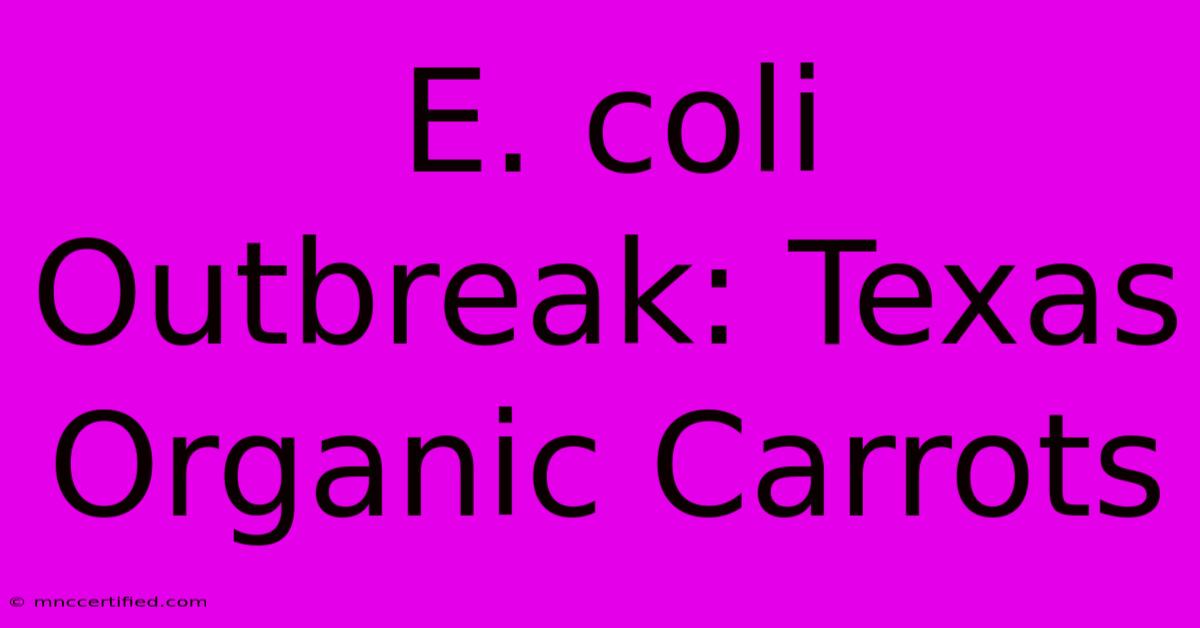E. Coli Outbreak: Texas Organic Carrots

Table of Contents
E. coli Outbreak Linked to Texas Organic Carrots: What You Need to Know
An outbreak of E. coli infections has been linked to organic carrots grown in Texas. This article will provide crucial information about the outbreak, its impact, and what steps you can take to protect yourself. We'll cover symptoms, prevention, and the latest updates from health officials.
Understanding the E. coli Outbreak
The Centers for Disease Control and Prevention (CDC) and other public health agencies are actively investigating a multi-state outbreak of Escherichia coli (E. coli) O157:H7 infections. Preliminary investigations strongly suggest a connection to organic carrots sourced from Texas. While the exact source of contamination is still under investigation, the focus remains on identifying the specific farm(s) and distribution channels involved. This investigation is crucial to prevent further illnesses and implement necessary safety measures.
What is E. coli O157:H7?
E. coli O157:H7 is a strain of bacteria that can cause severe foodborne illness. It's particularly dangerous because it produces toxins that can lead to serious complications, including hemolytic uremic syndrome (HUS), a type of kidney failure. Symptoms can range from mild to life-threatening.
Symptoms of E. coli Infection
Symptoms of E. coli infection typically appear 2 to 8 days after consuming contaminated food. These can include:
- Diarrhea (often bloody): This is a common and significant symptom.
- Stomach cramps: Severe abdominal pain is frequently experienced.
- Vomiting: While not always present, vomiting can be a significant symptom.
- Fever: A low-grade fever may occur.
Severe complications, such as HUS, are more likely in young children, the elderly, and individuals with weakened immune systems. Seek immediate medical attention if you experience symptoms of E. coli infection, particularly if your diarrhea is bloody or you develop symptoms of HUS (such as decreased urination, fatigue, and bruising).
Protecting Yourself from E. coli Contamination
The investigation is ongoing, but the CDC and other public health authorities recommend taking the following precautions:
- Avoid consuming organic carrots from Texas: Until further notice, it is crucial to avoid consuming organic carrots sourced from Texas. Check labels carefully to determine the origin of your produce.
- Wash your produce thoroughly: Always wash your fruits and vegetables, including carrots, thoroughly under running water before consumption, even if they are pre-washed or organic. Scrub firm produce with a brush.
- Practice safe food handling: Wash your hands frequently, especially before preparing or eating food. Cook meat to the proper internal temperature. Avoid cross-contamination by keeping raw meat separate from other foods.
- Stay updated: Regularly check the CDC website and other reliable sources for the latest updates on the outbreak and any revised recommendations.
The Importance of Traceability in the Food Supply Chain
This outbreak highlights the critical importance of robust traceability systems within the food supply chain. The ability to quickly and accurately trace the origin of contaminated produce is essential for containing outbreaks and preventing further illnesses. Improved traceability measures could significantly enhance food safety and public health.
What to Do if You Think You're Infected
If you suspect you have an E. coli infection, contact your doctor immediately. Early diagnosis and treatment can significantly reduce the risk of serious complications. Provide your doctor with details of your recent diet, including any consumption of organic carrots from Texas.
Disclaimer: This article provides general information and should not be considered medical advice. Always consult a healthcare professional for diagnosis and treatment. This information is current at the time of writing, but details about the outbreak may evolve as the investigation progresses. Refer to official sources like the CDC for the most up-to-date information.

Thank you for visiting our website wich cover about E. Coli Outbreak: Texas Organic Carrots. We hope the information provided has been useful to you. Feel free to contact us if you have any questions or need further assistance. See you next time and dont miss to bookmark.
Featured Posts
-
San Marino Promoted Uefa Nations League Win
Nov 19, 2024
-
Jennifer Lawrences 2024 Bodycon Look
Nov 19, 2024
-
Fcc Chair Carr Challenges Ahead
Nov 19, 2024
-
How Much Is Ufe Without Insurance
Nov 19, 2024
-
Worst Air In India 2024 Cities
Nov 19, 2024